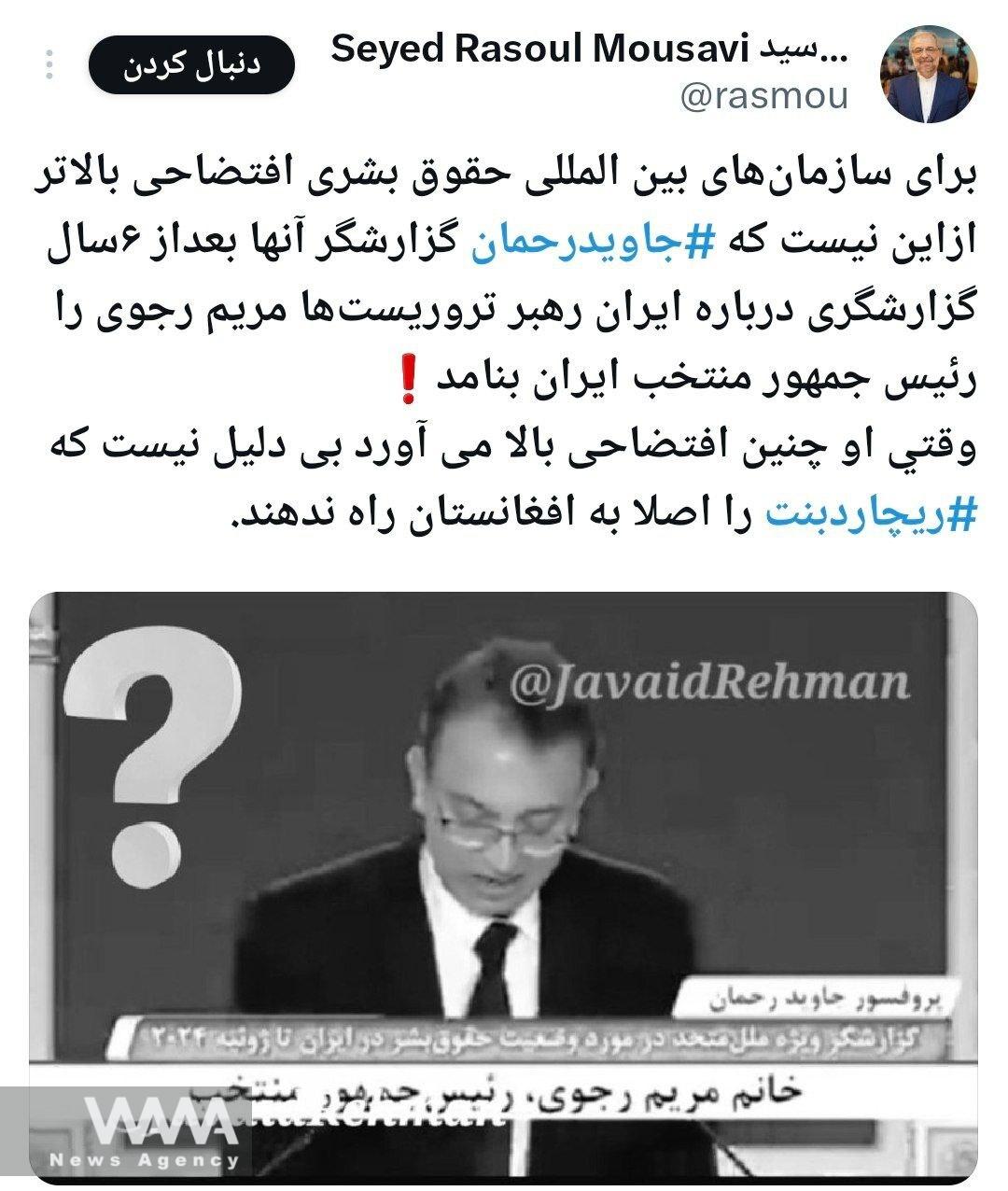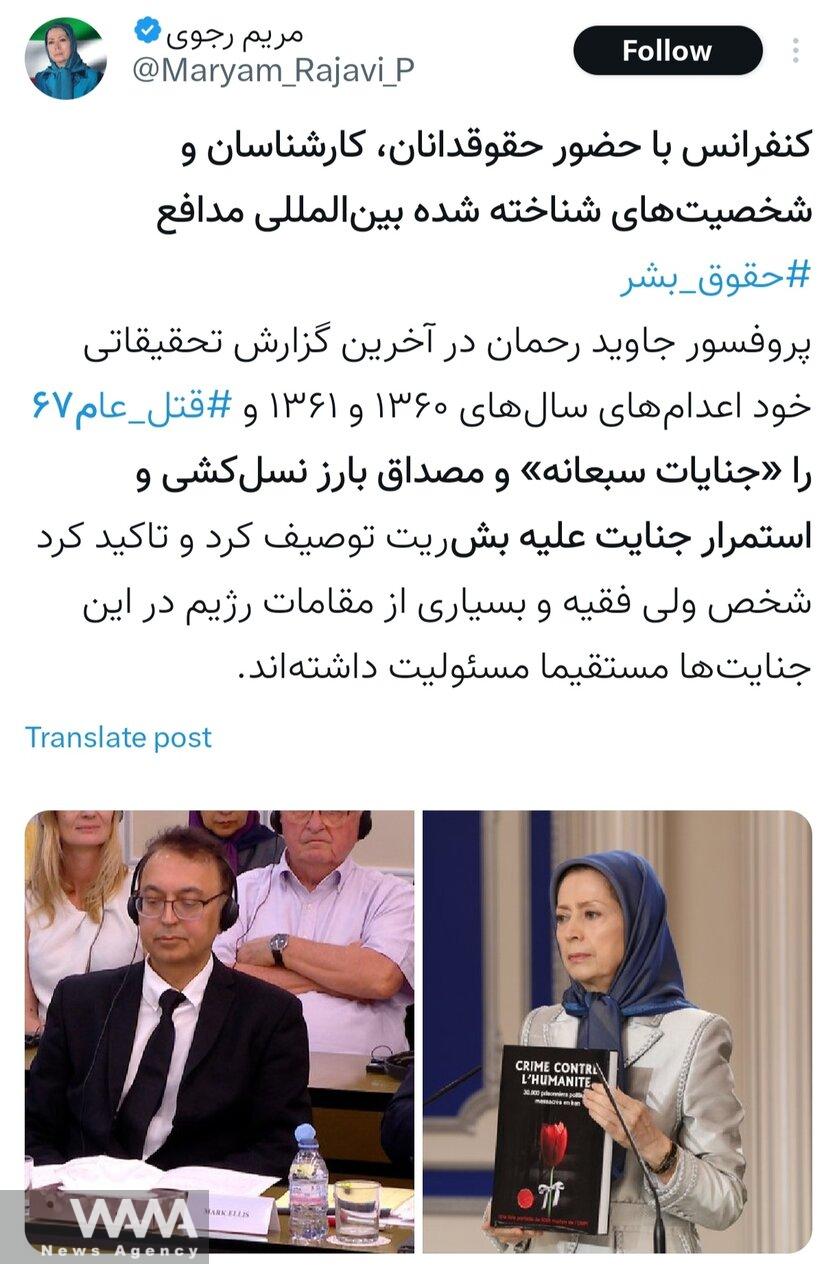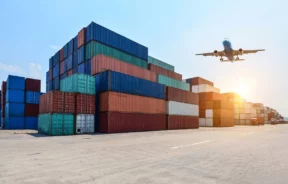Iranian Diplomats Condemn Former UN Rapporteur’s Presence at MEK Meeting
WANA (Sep 03) – Iranian diplomats have responded to the participation of Javaid Rehman, the former UN Special Rapporteur on Human Rights in Iran, in a meeting of the Mujahedin-e-Khalq (MEK), a terrorist group.
Seyed Rasoul Mousavi, Director General for South Asia at Iran’s Ministry of Foreign Affairs, wrote on his personal X account: “There is no greater disgrace for international human rights organizations than having Javaid Rehman, their rapporteur who reported on Iran for six years, refer to the terrorist leader Maryam Rajavi as the ‘elected President of Iran!'”
Abbas Bagherpour, Iran’s ambassador to Austria, also reacted, stating: “We are committed to promoting human rights and cooperating with the United Nations. However, this theater (the participation of the former UN Human Rights Council rapporteur in the MEK meeting) is evidence that the main source of the UN’s reports on Iran has been a terrorist cult that now, unsurprisingly, is funded by the same terrorist group! The misuse of UN structures by a few EU members will backfire.”

Seyed Rasoul Mousavi’s post l X account: “There is no greater disgrace for international human rights organizations than having Javaid Rehman,, refer to the terrorist leader Maryam Rajavi as the ‘elected President of Iran!'” . Social Media / WANA News Agency
Javaid Rehman’s tenure as the UN Special Rapporteur on Human Rights in Iran ended in late July 2024 after completing two three-year terms. Over the past decades, seven individuals have been appointed as Special Rapporteurs on Human Rights in Iran, with Rehman being one of them. He served from 2018 until just a few weeks ago.
Recently, the leader of the MEK published a picture on social media showing Rehman’s presence among the group’s members.
The MEK organized this meeting to coincide with the conclusion of Rehman’s alleged final report as the UN Special Rapporteur, attended by other figures opposed to the Iranian government.
Before leaving his six-year mission and passing it on to the Japanese Mae Sato, Rehman claimed during a meeting in Geneva in mid-June that he had achieved significant success with the writing of his final anti-Iranian report before the end of his mandate on July 31.
In his report, Rehman made recommendations and called for the establishment of an independent international mechanism to address what he described as human rights violations by Iran and urged the international community to take action in this regard.

The leader of the MEK posted a picture on social media showing Rehman’s presence among the group’s members. Social Media / WANA News Agency
During his six years as the UN Special Rapporteur on Human Rights in Iran, Rehman produced 10 comprehensive reports under the supervision of the UN Human Rights Council, focusing on issues such as political executions, the dire situation of religious and ethnic minorities, torture and inhumane treatment of prisoners, repression of sexual minorities, violence against women, the killing of children, and sexual violence.
Rehman’s reports were prepared without him ever visiting Iran to assess the issues he discussed. Instead, his reports were based on statements from anti-Iranian groups outside the country.
The significance of the activities of Special Rapporteurs on Human Rights is not limited to their assigned tasks by the UN Human Rights Council; their work is also used and referenced by other international bodies, including the UN General Assembly, the International Court of Justice, and human rights organizations.
The U.S. and European countries’ accusations against Iran regarding human rights violations are often based on the reports of the UN Special Rapporteurs on Human Rights in Iran, which have led to numerous sanctions.













